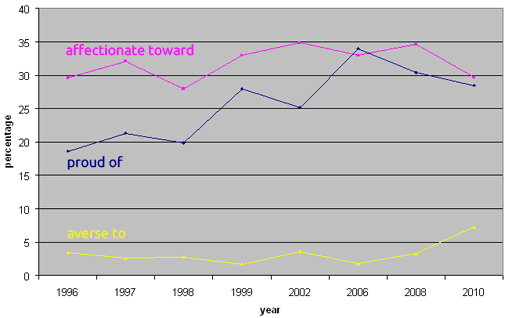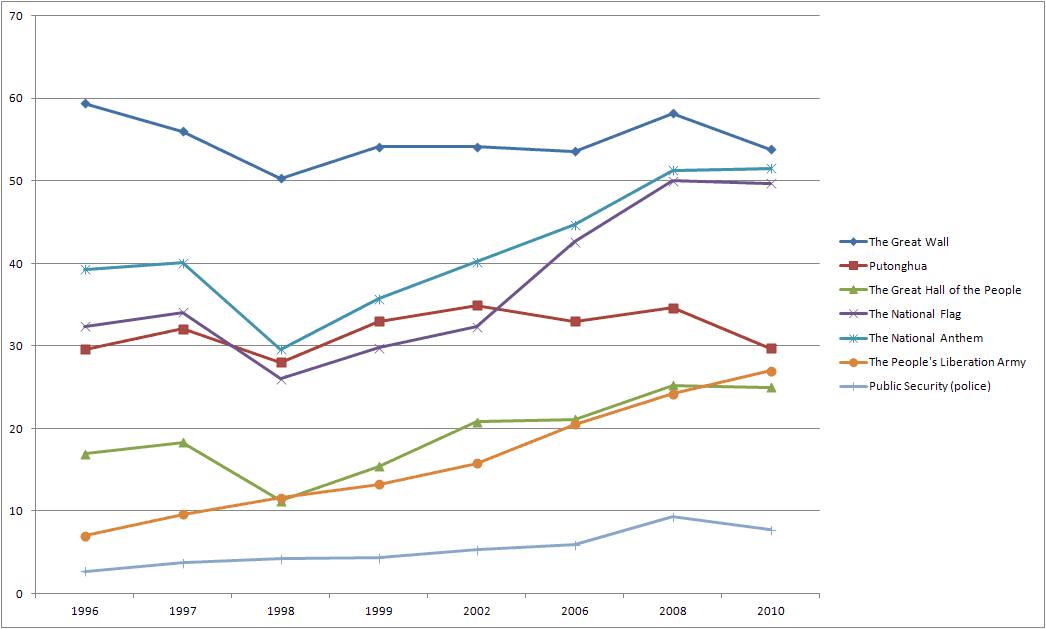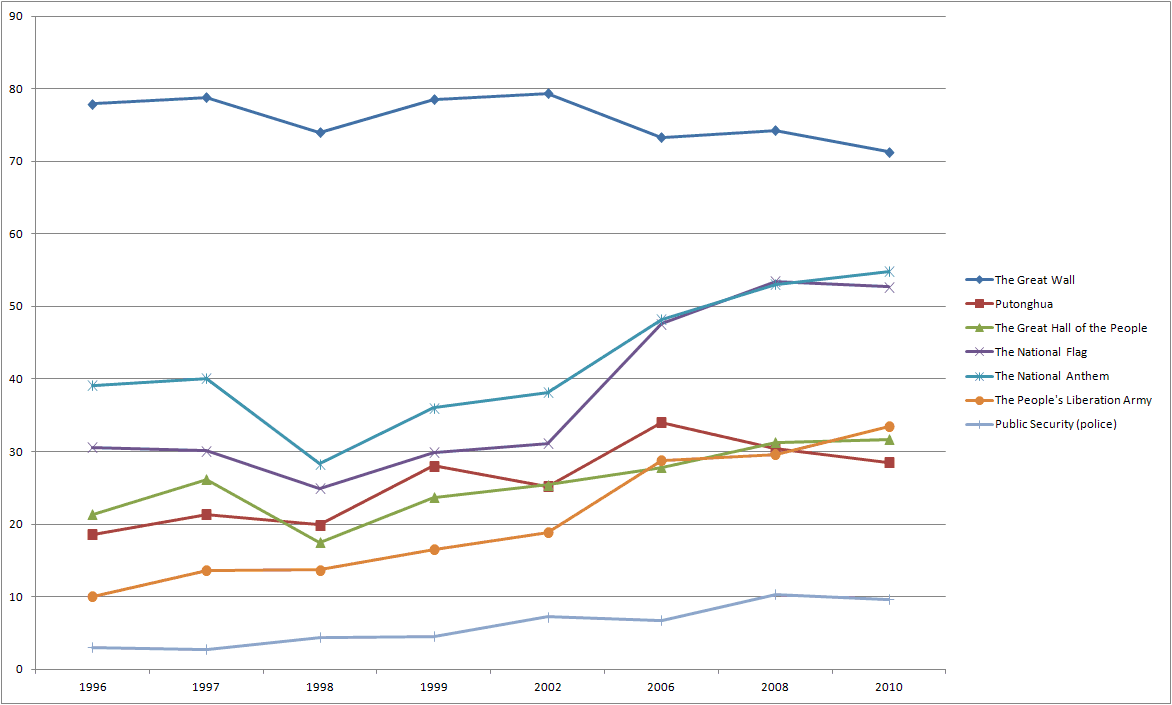Mandarin is less well loved in Hong Kong than most other “icons” of China, according to the results of a survey there.
Although the percentage of those who described themselves as “averse” (kàngjù) to Mandarin is quite small (in the single digits), it has quadrupled since 2006 (1.8% to 7.3%). (I’m using the English and Mandarin terms given in the source material.)
Meanwhile, the percentage of those who are “affectionate” (qīnqiè) toward Mandarin has dropped, though not to an all-time low. And the percentage of those who are “proud” (zìháo) of Mandarin is also down, though it remains much higher than it was in 1994 when the survey began.
Affection toward, pride in, and averseness to Mandarin in Hong Kong, 1994-2010

Interestingly, averseness to Mandarin has been growing, while averseness to most other mainland icons has been dropping.
In the graphs below I have omitted some surveyed icons — Hong Kong’s regional flag/emblem, the night view of Victoria Harbor, the Legislative Council building, the Hong Kong and Shanghai Bank Building, and the Bank of China Building — to keep the graphs from getting too busy looking and because those are within Hong Kong itself.
The lines for Mandarin are in dark red. Click to enlarge the images to a useful size.
Percentage of respondents feeling “averse to” Mandarin (“Putonghua”) and other Chinese icons

Percentage of respondents feeling “affectionate towards” Mandarin (“Putonghua”) and other Chinese icons

Percentage of respondents feeling “proud of” Mandarin (“Putonghua”) and other Chinese icons

But even though Mandarin hasn’t gained much affection recently from the people of Hong Kong, it’s still far more liked than the least popular of the PRC’s institutions: the police (gōng’ān).
sources and further reading:
- Xiānggǎngrén de shēnfen yǔ guójiā rèntóng: diàochá jiéguǒ (香港人的身份與國家認同:調查結果), Center for Communication Research at the Chinese University of Hong Kong
- The Identity and National Identification of Hong Kong People: Survey Results, Center for Communication Research at the Chinese University of Hong Kong
- Hong Kong’s pride in Putonghua, Pinyin News, December 2, 2006

Maybe the Hong Kong government should increase effort in promoting Standard Chinese.
I wonder if replacing ???? with ????? would yield different results? Incidentally, although not stated I assume the survey is only targeted at ethnically Chinese HK Permanent Residents.
Gummy Worm: this post is about Mandarin (which is named in the survey as Putonghua rather than Guoyu). If your meaning is that HK’s Government should promote Putonghua – why? A lot of HK people seem either indifferent to or dismissive of the government most of the time! If they ever come to like the PRC and everything that comes with it, it won’t be through any government initiatives but through a genuine recognition of any positive aspects that may exist.
@Will
It is not about liking or not liking the PRC. This type of chauvinistic attitude is a form of HK’s looking down on Mainlanders as country bumpkins, which goes back to way before 1949 and PRC founding. If you ask any Yue (Cantonese) speaking person in Guangdong or Wu speaking person in Shanghai, they will tell you how proud they are of their own tongue and be very dismissive of Mandarin. They will still speak the latter, but only because it is necessary as lingua franca. And honestly, that is what the PRC wants. It doesn’t want to exterminate local Chinese languages – it just wants people from all parts of the country to be able to communicate.
And I think that HK people will snub Mandarin whether the mainland government is Communist, Authoritarian-Capitalist under KMT, or a democracy. And people in non-Mandarin speaking regions on the mainland will still keep their own tongues and be dismissive of the Mandarin lingua franca, albeit they will learn to speak it.
@Most: If the government of the PRC really doesn’t want to exterminate the languages of China other than Mandarin it should stop doing things toward exactly that end. One thing that recently made the news is how buses in Shanghai will have announcements in Shanghainese as well as Mandarin. This was notable because although having announcements in the language of a place should be nothing out of the ordinary, the truth is that the government has long worked to suppress languages other than Mandarin and can be remarkably petty about just how far it will go to do so. Sure, there’s lip service in favor of local “flavor” or the like. But lip service is all it is. And the suppression is working.
As for the tendency of HK people to snub anything from China, yes, there’s something to that. But what’s interesting about this survey is that it covers a variety of topics. Not everything from China is regarded as poorly as Mandarin. Look at the trends across topics. Compare, for example, attitudes toward the PLA over time with attitudes toward Mandarin. Mandarin has been faring considerably less well lately in the hearts and minds category.
How about Macao? Do you have any information?
The survey covered only Hong Kong. I found a news story of a less broad and less scientific poll in Macau: Putonghua fluency strengthens Macau ’s competitiveness according to survey. But there’s nothing there that makes clear the *year* for that.
hmm, interesting. How did they go about getting this information? And, is there any information for their feelings towards English or Cantonese? Perhaps they’re related somehow.
As I noted in my previous coverage of this survey, “Unfortunately, related questions on pride in Cantonese and English were not asked, so we don’t know how feelings about Mandarin stack up against those for the two other important languages of Hong Kong.”
You can see the survey method and information on the sample here.
Pingback: Attitudes in Hong Kong toward Mandarin and Cantonese | Pinyin News